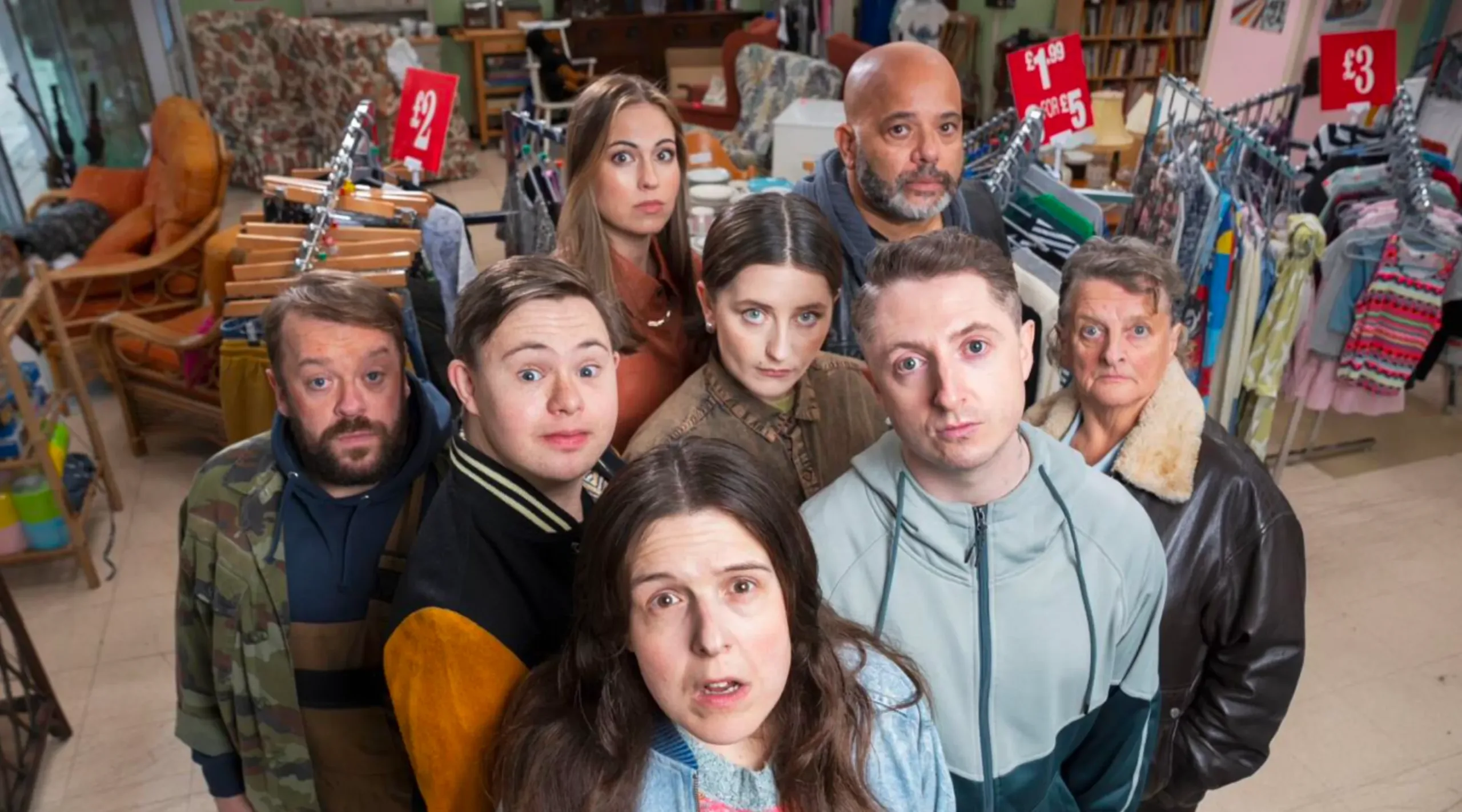In the current landscape of television, where narratives of social justice often lean into stark drama, Pushers arrives with a refreshingly cynical and comedic proposition. Its central idea is both a provocation and a sharp piece of social commentary: society has rendered disabled people so functionally invisible that they are, in fact, perfectly positioned for a life of crime.
The series introduces us to Emily, a woman with cerebral palsy portrayed by the show’s co-creator, Rosie Jones. Her journey begins not with ambition but with desperation, catalyzed by the bureaucratic absurdity of a work capability assessment that cuts her benefits.
This indignity pushes her into the orbit of Ewen, a witless old school friend who sees her disability not as a limitation, but as the ultimate cover for his small-time drug dealing. Set against the grim backdrop of the fictional northern town of Bracklington, the show immediately establishes a tonal friction between its bleak, all-too-real premise and the sharp, often farcical, humor it uses to dissect it.
Weaponizing Invisibility
The series wastes little time in moving its protagonist from a position of systemic victimhood to one of criminal agency, a narrative acceleration that feels like a statement in itself. Emily’s initial foray as a drug mule is less a descent into darkness and more a moment of stark revelation.
She discovers that the very disability society uses to define and dismiss her has become a kind of superpower—an invisibility cloak woven from prejudice and patronizing assumptions. This is powerfully illustrated in a scene where she deflects police attention from a bag of cocaine by feigning incontinence, transforming a stereotype of vulnerability into a tactical advantage.
While her swift, almost jarring, pivot from reluctant courier to ambitious kingpin—making unilateral decisions to deal spice behind her partner’s back—is not deeply interrogated, it suggests a commentary on survival. In a world that offers no legitimate path forward, the turn to illegitimacy is not a moral failing but a pragmatic choice.
This nascent enterprise is built not on muscle but on marginalization. Emily recruits her team from the “Wee CU” charity where she volunteers, assembling a crew that represents a cross-section of dismissed potential. There is Hope, a neurodiverse and ruthless strategist whose qualifications include treasuring The Bill fan club and mastering drug-dealer simulations—skills honed in niche communities, now repurposed for the streets.
Alongside her are Harry, a dance enthusiast with Down’s syndrome, and Sean, a local alcoholic whose feigned psychotic outbursts become a tool of intimidation. The show’s most potent irony lies in its setting: the charity, a bastion of performative social good focused on disabled toilets, is effortlessly converted into the operational hub for a narcotics ring. The very structures meant to patronize and manage the disabled are thus co-opted, becoming the engine of their defiant, and illegal, empowerment.
Beyond the Archetype: A Portrait of Flawed Humanity
At the heart of Pushers is a collection of characters whose primary function is to dismantle television’s tired archetypes of disability. As the pragmatic anti-hero Emily, Rosie Jones anchors the entire series. She consciously tones down her exuberant stage persona to become the show’s gravitational center, the often-exasperated straight woman reacting to a universe of absurdity.
Yet, her performance is infused with an authentic, cheeky defiance that prevents Emily from ever becoming a simple victim; she is an active participant, even an agent of farce, whose recurring mishaps with exploding bags of cocaine serve as a running gag on the sheer messiness of her new enterprise. While Emily grounds the show in a relatable reality, Ryan McParland’s Ewen is a force of pure chaos.
He is the engine of absurdity, a man of such profound and intense stupidity that he elevates conventional dimwit tropes into something genuinely unpredictable. His confident delivery of malapropisms like “cerebral paisley” or his earnest confusion over a carton of UHT milk are not just jokes; they are windows into a mind operating on a different, gloriously illogical plane, and McParland’s loud, weird energy is essential to the show’s comedic rhythm.
This dynamic is expanded across the supporting cast, where the show does its most important cultural work. The characters are defined by their distinct personalities and obsessions, not their diagnoses. Libby Mai’s performance as Hope is a particular triumph; her stern, neurodiverse-coded ruthlessness and deadpan delivery provide some of the sharpest moments.
A scene of her experiencing near-transcendent bliss while dancing to a remix of The Bill’s theme music is a masterful piece of physical comedy that paints a portrait of a character rich with inner life. This careful construction of flawed, funny, and driven individuals makes the show’s occasional reliance on flatter caricatures, like Emily’s shallow and self-serving boss Jo, all the more noticeable. These weaker figures highlight by contrast how revolutionary the core ensemble truly is, presenting a group of people whose disabilities are a simple fact of their existence, not the sum of it.
The Friction of Farce and Reality
Pushers operates in a state of constant tonal negotiation, blending its comedic styles with a deliberate, almost defiant, unevenness. The show’s humor draws from multiple wells: there is broad, physical slapstick, but it sits alongside fiercely intelligent observational jokes about the indignities of living with a disability.
An absurdist sensibility, likely inherited from co-writer Peter Fellows of Veep fame, allows for surreal flights of fancy that prevent the proceedings from becoming too earthbound. Yet, this comedic palette is not always harmonious. For every brilliantly sharp gag that skewers societal prejudice, there is a recurring reliance on less-inspired toilet humor, creating moments where the show’s cleverness feels momentarily diluted by its commitment to silliness.
This tension extends to its satirical voice. The series lays out a premise ripe for bleak social realism—a scathing indictment of a benefits system designed to dehumanize—and then consciously swerves into lighthearted farce. It pulls its punches, consistently choosing character-driven comedy over the grim implications of its subject matter.
This is not a failure but a strategic choice; by refusing to become a polemic, Pushers makes its critique accessible, though it sacrifices some potential incisiveness in the process. The result is a satire with a soft, sometimes shaky, edge. This structural unsteadiness is also reflected in its pacing. The narrative takes its time to build, with early episodes meticulously establishing the world before the plot fully ignites.
As the series progresses, however, it struggles to manage its own momentum, becoming entangled in underdeveloped romantic subplots that distract from the core crime story. This creates a noticeable friction between the hyper-realistic, gritty backdrop of a neglected town and the often cartoonish, larger-than-life behavior of its central characters, leaving the show caught in a compelling but unstable balance between two conflicting realities.
An Important, Imperfect Blueprint
The ultimate value of Pushers lies in its potent central concept and the radical, matter-of-fact nature of its representation. The series offers a vital television model where characters are defined by their wit, ambitions, and flaws first, with their disabilities being a component of their identity rather than its totality.
This achievement is anchored by the compelling chemistry between its leads; Rosie Jones provides the grounded, defiant heart of the operation, while Ryan McParland’s chaotic energy fuels its most hilarious, absurdist moments. When the show fires on all cylinders, it produces standout scenes of pure comedic brilliance that feel both fresh and culturally significant. The series is at its best when it leans into the strengths of this core idea and the vibrant personalities it has assembled.
Yet, for all its conceptual strength, the show’s narrative architecture is not always as sturdy. The plot occasionally loses focus, meandering into subplots that dilute its momentum, and the stakes often feel curiously low, with a benign police force that blunts any real sense of peril. Emily’s abrupt transformation from a desperate citizen into a calculating criminal strategist lacks a clear psychological underpinning, leaving a gap where a more complex character study could have been.
Furthermore, the show’s frequent turns to broad, slapstick comedy sometimes sit uneasily with its sharper satirical aims, softening the potential impact of its social critique. Pushers presents a fun, energetic, and culturally necessary sitcom that, despite its narrative flaws, offers a memorable cast and moments of true brilliance as an assured debut for its creator.
Pushers is a six‑episode British comedy series that premiered on June 5, 2025 via Channel 4+ (a premium streaming tier), with a full public broadcast debut on June 19, 2025 on Channel 4 and its on‑demand service.
Full Credits
Writers: Rosie Jones, Peter Fellows
Producers and Executive Producers: Charlie Laurie (producer); Clelia Mountford, Michael Livingstone, Tom Thostrup (executive producers)
Cast: Rosie Jones, Ryan McParland, Jon Furlong, Libby Mai, Rhiannon Clements, Ruben Reuter, Trevor Dwyer‑Lynch, Lynn Hunter, Clive Russell, Rosalyn Wright, Cassie Bradley, Jade Asha
The Review
Pushers
Pushers is a vital and frequently hilarious series built on a brilliant concept and truly groundbreaking representation. While its narrative falters with an unfocused plot and its satire is sometimes softened by broad comedy, the show is carried by the electric performances of its leads and a cast of memorable characters. It's an important, imperfect, and energetic debut that challenges television's tired conventions, making it a worthy watch for its boldness and heart.
PROS
- A clever and provocative central premise.
- Excellent lead performances from Rosie Jones and Ryan McParland.
- Groundbreaking, matter-of-fact representation of disabled characters.
- Sharp, witty humor that skewers societal attitudes.
CONS
- An unfocused plot that gets messy with underdeveloped subplots.
- Inconsistent tone, shifting between sharp satire and broad slapstick.
- Underdeveloped character motivations for key plot turns.
- Low narrative stakes that can blunt the story's tension.

















































